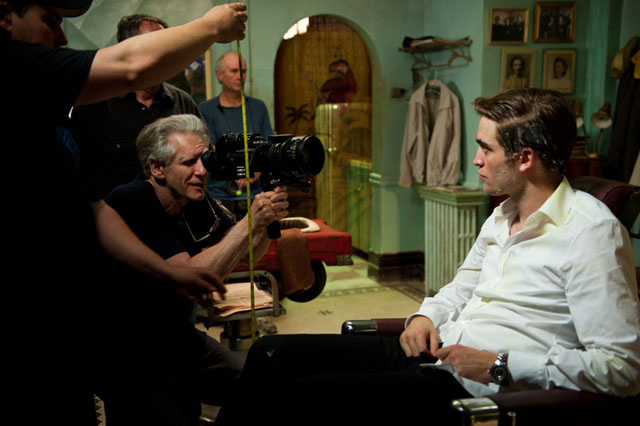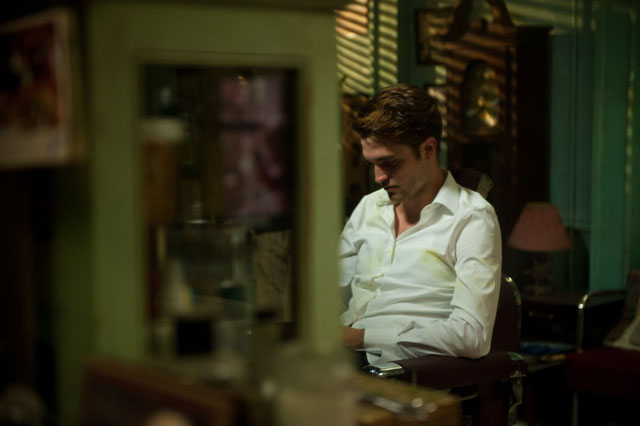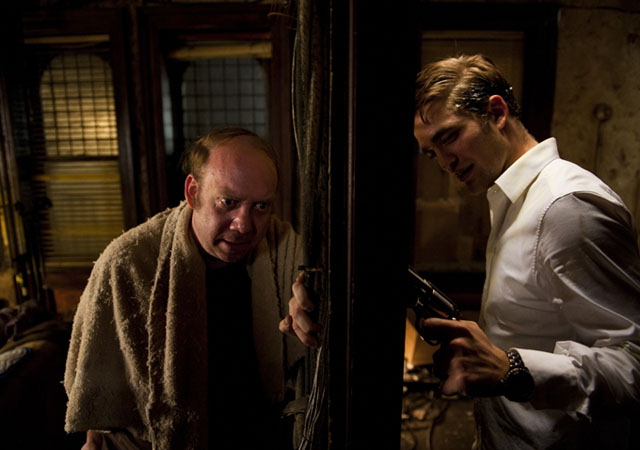We gathered a first round of reviews of David Cronenberg’s Cosmopolis back in May when it premiered at Cannes, but of course, whipping up a few paragraphs within hours of a first viewing (while racing from one theater to the next) is one thing, and giving a film at least a few days’ serious consideration before mapping out an assessment is quite another. As we sample this summer’s second batch, let’s first dip a bit into a must-read J. Hoberman wrote for the Los Angeles Times last week. The strongest paragraphs address the body of Cronenberg’s work, justifying the argument made just before that “Cronenberg is not only Kubrick’s heir as the most experimental narrative filmmaker at work today but the most provocative and consistently original North American director of his generation. Granted, Martin Scorsese’s quartet of Mean Streets, Taxi Driver, Raging Bull and The King of Comedy, all with Robert De Niro, is an accomplishment without parallel in post-’60s Hollywood cinema, and, yes, Steven Spielberg is a pop-culture virtuoso as well as the most influential commercial moviemaker of the last 35 years. But despite his gifts, Scorsese has never returned to his early form while, for all his ambition, Spielberg’s supreme achievements remain his pure entertainment machines (Jaws, E.T., Jurassic Park). Two other contenders, David Lynch and Brian De Palma, have each made brilliant films (Blue Velvet, Blow Out), but more often than not their experiments have blown up in the lab; scanning the horizon, the tallest tree is Paul Thomas Anderson. Cronenberg’s career-long consistency is unmatched.”
Do read on. And like Hoberman, Dennis Lim, writing in the New York Times, argues that Cosmopolis has at least a couple of cousins within the oeuvre. “Marshall McLuhan famously described media as ‘extensions of man,'” and Cronenberg “has made several movies that count as mind-bending elaborations of that insight. In Videodrome (1983) a video signal embedded in a pornographic cable broadcast causes hallucinations and bodily transformations in its viewers. The game players of eXistenZ (1999) download alternate realities by plugging squishy protoplasmic pods directly into their spines.” Cosmopolis “takes place in a spectral world of global capital, digital information and virtual everything. Its currency-trading billionaire hero, cocooned in a white stretch limousine that serves as a second skin, deals and speaks in abstractions and is himself something of a hologram, an inscrutable young master of a conceptual universe.”
Karina Longworth in the Voice: “Boyishly lean, with a brooding angularity that suggests both high maintenance and nefarious vacancy, Robert Pattinson has managed to fill the role of a grade-A male sex symbol without ever evincing anything like carnal energy, to top the Hollywood A-list as a representative of the undead. Pattinson’s casting in Cosmopolis as Eric Packer, a 28-year-old finance prodigy ensconced in a stretch limo on a 24-hour odyssey across Manhattan to get a haircut, gives director David Cronenberg (who has sole screenplay credit for the first time since 1999’s eXistenZ) an automatic meta-text to play with. Updating Don DeLillo’s post-9/11 New York story into an ambiguous, dry black comedy, Cronenberg subverts a postmillennial mass media moment that considers this guy to be the male ideal.”
Ryland Walker Knight calls this the “best promo tie-in in the history of cinema.”
“Eric, you see, is a contingent creation, an accretion of habits and conventions, a postmodern construction,” writes Manohla Dargis in the NYT. “At first he seems like a manifestation of the artist Barbara Kruger’s brilliant 1987 commentary on consumer culture: ‘I Shop Therefore I Am.’ Eric buys and sells money, but because money has changed, the self who buys and sells it has transformed too. ‘Money has taken a turn,’ says Eric’s chief of theory, Vija Kinsky (Samantha Morton, a mesmerizing, droning delivery system), one of the handful of visitors who pop in and out of Eric’s limo, dispensing bad news and aperçus. The Greeks had a word for the art of moneymaking (‘chrimatistikos’), but now, she continues, ‘all wealth has become wealth for its own sake,’ and money, having lost its narrative quality, ‘is talking to itself.'”
MSN Movies‘ Glenn Kenny finds something “deeply despairing beneath the droll allegory of how capitalism can’t move across a dozen city blocks without leaving a bunch of charred wreckage in its wake. And, yes, I did say droll. At its heart, Cosmopolis is a very mordant comedy. People coming to the picture expecting a kind of realism will be direly disappointed, because even the salt of the earth here, such as they are, don’t talk like ‘real’ people. DeLillo’s heightened language has the unusual quality of being kind of flat and baroque simultaneously, and this melds well with Cronenberg’s verbal style (toward the end we also get overtones from another Cronenberg favorite, William S. Burroughs). It also meshes perfectly with Cronenberg’s spare but exacting shooting and cutting style. He examines irrationality with the unflinching precision of a diamond cutter, and the results are as hilarious as they are shocking.”
“Cronenberg accomplishes an almost alchemical transmutation of the source material, indelibly stamping it with his own abiding preoccupations, while still hewing closely to the book’s tone and tectonics, even extracting entire exchanges almost verbatim.” Budd Wilkins in Slant: “Just as Cosmopolis‘s varied visual palette allows Cronenberg and DP Peter Suschitzsky to construct an imagistic index of his other films, its episodic structure affords Packer a series of thematic sounding boards. Some, like advisor Vija Kinsky (Samantha Morton), seem tailored for a quantum of philosophical rumination, a buffed-up, abstract sort of speculation on speculation. Others, like fidgety flunky Shriner (Jay Baruchel), supply a modicum of comic relief. There are even moments of inspired surrealism as with the sexually charged discussion between Packer and his chief of finance, Jane Melman (Emily Hampshire), that occurs while Packer submits to a prostate exam…. Packer’s asymmetrical prostate, incidentally, comes to symbolize everything that his rigorous economic algorithms cannot quantify, that specter of unpredictability that haunts every system, and that prompts Packer to put it all on the line. From the credible threat on his life in the form of a disgruntled former employee, to a televised political assassination that resembles an exceptionally gory bullfight, instability happens to be Cosmopolis‘s watchword.”
Of course, not everyone is won over. The New Yorker‘s Richard Brody: “For all the big ideas and powerful forces packed into the movie’s tight spaces, the overriding tone is that of a responsible citizen’s earnest lament in the wake of economic meltdown. With its bent toward substantive critique, the movie quickly devolves to cant without rising to parody…. Cronenberg found a distinctive aesthetic not for the film’s subject—a banker and his downfall—but for DeLillo’s novel. It’s the very constraint of adaptation that, here, turns Cronenberg audacious. The movie is notable not for its depiction of events, embodiment of characters, or unfolding of drama, but for its setting of a text; at its best, it’s an exercise of style, of a style that’s wondrously decadent in remaining skew to the content. But that content is at war with the very fact of the director’s own splendid self-indulgence, a peccadillo for which he, and the movie, ultimately pays.”
Back for a moment to Karina Longworth, quoted above, who also argues that “much of the film fails to function as drama and never more so than in the interminable final scene, a two-hander in which Packer finally confronts his would-be assassin in what could be rooms of his own mind.” More from Simon Abrams (Voice), Richard Corliss (Time), Steve Dollar (GreenCine Daily), Bilge Ebiri (Vulture), David Ehrlich (Box Office, 4/5), Charles H. Meyer (Cinespect), Keith Phipps (AV Club, C), Nicolas Rapold (L), Joshua Rothkopf (Time Out New York, 4/5), Dana Stevens (Slate), Scott Tobias (NPR), and Alison Willmore (Movieline, 7.5/10).
Interviews with Cronenberg: Steve Erickson (Atlantic), Scott Macaulay (Filmmaker), Rick Marshall (IFC), and Andrew O’Hehir (Salon). For Time, Jessica Winter talks with both Cronenberg and Pattinson. And Christine Spines introduces an interview for Word and Film: “It’s not giving too much away to reveal that Paul Giamatti is the only significant character in the film who doesn’t come and go without making a mess.” IndieWIRE‘s Nigel M. Smith talks with Giamatti, too.
A few more odds and ends. In a terrific piece for indieWIRE, Vadim Rizov notes: “The plot was originally conceived for Game 6, a screenplay DeLillo wrote in the early 1990s that sat unfilmed until 2005. In the meantime, he cannibalized the structure for Cosmopolis, published in 2003: hence, two takes on overlapping material.” Following a string of comparisons and contrasts, Vadim argues: “If Game 6 is smart people performing an adaptation task they fear is impossible, Cosmopolis is a perfect pairing of director and author.”
At the AV Club, John Semley notes that “a whole incidental target demographic of #TeamEdward true believers in their homespun fan shirts may be taking away lessons about large-scale market economics, the historical allure of celebrity assassination, and just what how much a painting by abstract expressionist painter Mark Rothko is really worth.”
And then there’s the shit storm Cronenberg kicked up the other day when he laid into The Dark Knight Rises. “It’s still Batman running around in a stupid cape,” he told Brooke Tarnoff at Next Movie. “It’s for kids. It’s adolescent in its core. That has always been its appeal, and I think people who are saying Dark Knight Rises is ‘supreme cinema art,’ I don’t think they know what the fuck they’re talking about.”
David Liu sees an echo of Alain Resnais’s Last Year at Marienbad (1961) in Cronenberg’s A Dangerous Method (2011). Meantime, Cronenberg was set to start shooting a sequel to Eastern Promises (2007) in October, but he’s told the Playlist‘s Drew Taylor that James Schamus at Focus Features has pulled the plug. So Cronenberg’s got nothing “lined up, and is instead focusing on finishing a novel that he’s writing that is, according to him, ‘two years late.'”
Pattinson, on the other hand, has plenty lined up, naturally, including a role as T.E. Lawrence in Werner Herzog’s Queen of the Desert. Ben Child has more in the Guardian.
Updates, 8/20: J. Hoberman contrasts his first and second viewings: “Although adventurous in its overt formalism, Cosmopolis seemed lacking in brio, a kind of narcotic Fellini trip that, in writing an appreciation of the Cronenberg oeuvre, I characterized as ‘an exercise in constant natter and glacial forward glide—a movie that lulls even as it disconcerts.’ Seen again with a paying audience at the Walter Reade (and without the burden of expectation), Cosmopolis came across as a credible, intelligent, fully realized piece of work, well-acted, charged with subtext, and marred mainly by the filmmaker’s struggle to release the comic elements he found in DeLillo’s labored novel.”
The New Yorker‘s David Denby: “Cronenberg has made an eccentric and beautiful-looking movie—a languid, deadpan, conceptualist joke.”
I also want to add this one bit from Andrew O’Hehir‘s interview with Cronenberg: “At one point Paul Giamatti texted me and said, ‘I can’t believe this. Rupert Murdoch just got a pie in the face!’ That was just after we’d shot the scene where Rob’s character gets a pie in his face from an anti-capitalist protester. That was all very spooky, but that wasn’t my motivation for making the movie. It wasn’t like, ‘Oh, yeah! This is the movie about capitalism I’ve always wanted to make!’ You know, you absorb the Zeitgeist, if your antennae are sensitive enough.”
For news and tips throughout the day every day, follow @KeyframeDaily on Twitter and/or the RSS feed. Get Keyframe Daily in your inbox by signing in at fandor.com/daily.






